9 People Who Made Their Political Mark in 2012
From a numbers wonk to a gregarious mayor, these people mattered in 2012
Dec. 10, 2012— -- 2012 was a watershed year in many ways. Immigration occupied a great deal more space in the national political dialogue than in previous years, and Latino voters, as Rep. Luis Gutierrez (D-Illinois) said earlier this year, were the"belle of the ball" this presidential election.
A numbers wonk ran for vice president and a temperamental governor soared in popularity after leading his state through a natural disaster. They and others made our list, in no particular order, of up-and-coming political figures who had an impact in 2012.
1. Julián Castro
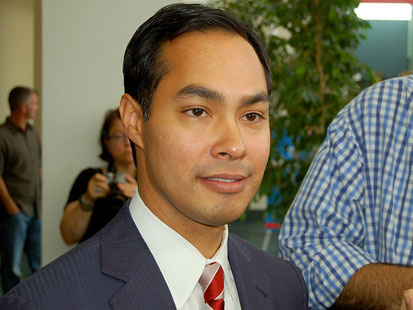
The Mexican-American San Antonio mayor was launched into the spotlight earlier this year when he became the first Latino to give the keynote address at the Democratic National Convention. The 38-year-old grew up around politics with his mother serving as a leader in the Chicano movement in San Antonio and his brother was just elected to the House of Representatives.
Many have compared him to President Barack Obama, who became a household name after giving a rousing keynote at the Democratic National Convention in 2004. Both went to Harvard Law School and were largely raised by single mothers. Castro does not speak Spanish, and has gained appeal beyond the Hispanic community. Among the causes he's championed are gay rights and education reform.
He may very likely be a presidential contender one day, but Castro himself downplayed that possibility during an interview with ABC/Univision News earlier this year.
"It's very likely that the first Latino president has been born, [but] I don't think that I'm going to be that person," he said.
Maybe his young daughter will fill that role. After all, she certainly stole America's heart during her father's convention speech.
2. Ted Cruz
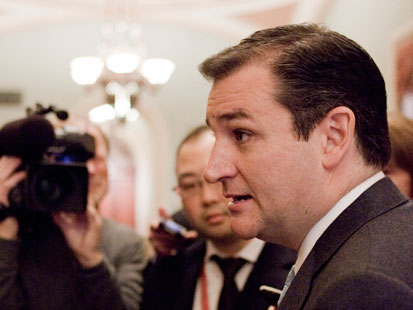
The Tea Party-backed Cruz will fill outgoing Senator Kay Bailey Hutchison's seat come January to become the first Latino senator from Texas. Canadian-born Cuban-American Cruz beat Lieutenant Governor David Dewhurst in a hard-fought runoff for the Republican nomination. He was previously the first Hispanic to serve as solicitor general of Texas. He was also a constant presence on Twitter in the run-up to the election and succeeded in drumming up a vocal conservative base of supporters.
After his win, Cruz was named vice chairman of the National Republican Senatorial Committee, a group aimed at getting more Republicans into the Senate. He's made it clear he's ardently opposed to Obama's healthcare plan and has accused Democrats of making Americans dependent on federal government. Cruz also does not support a path to citizenship for undocumented immigrants, and he favors giving local authorities the ability to inquire about someone's immigration status.
He blamed the Republican Party's poor performance with Latinos on Mitt Romney's "47 percent" comment following the election, and not immigration.
"'We don't have to worry about them' is what the famous clip said," Cruz told attendees at a gala for the conservative American Principles Project in November. "Tone on immigration contributed, but I think far more important was '47 percent."
Cruz gained widespread attention within his party, as he added to the Republican numbers in the Senate. But ignore the buzz about Cruz being a presidential contender someday. He was born in Canada.
3. Chris Christie
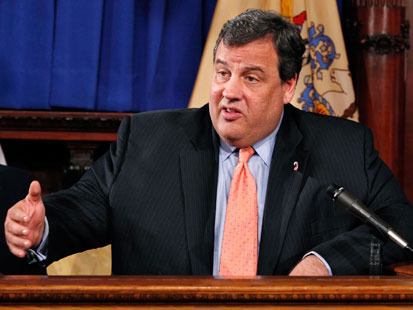
As governor of a blue state, New Jersey governor Christie has gained both a reputation as a straightforward, down-to-business guy and a firecracker who occasionally loses his cool with reporters. He has vocally criticized Obama's healthcare law and his handling of the flailing economy.
"I don't know about you, but I don't want my children and grandchildren to have to read in a history book what it was like to live in an American Century," he said during his convention speech. "I don't want their only inheritance to be an enormous government that has overtaxed, overspent and over-borrowed a great people into second-class citizenship."
And his approval ratings at the end of 2012 are sky-high following super-storm Sandy. The hurricane hit New Jersey particularly hard, and Garden State constituents were pleased with his get-in-and-get-it-done handling of the crisis. He campaigned heavily for Romney during election season, but also praised President Obama for his handling of the storm. His high approval ratings are somewhat remarkable, given that, as Christie pointed out during his convention speech, he's "from a state with 700,000 more Democrats than Republicans."
He's thrown his support behind some interesting figures, immigration-wise, endorsing Rep. Steve King (R-Iowa) who once compared immigrants to dogs. But he's also adopted a more humane tone toward immigrants himself, calling for a "common-sense path" to citizenship and tighter border security. As the Los Angeles Times noted, Christie told a church forum in 2008 that "being in this country without proper documentation is not a crime," when he was serving as the U.S. attorney in New Jersey.
"The whole phrase of 'illegal immigrant' connotes that the person, by just being here, is committing a crime," he said. "Don't let people make you believe that that's a crime that the U.S. attorney's office should be doing something about."
Christie has also taken more moderate stances on other issues such as climate change – global warming exists, he acknowledges – and gay rights – he opposes gay marriage, but nominated a gay man to the New Jersey Supreme Court.
Don't be surprised to see him run for president in 2016.
4. Elizabeth Warren
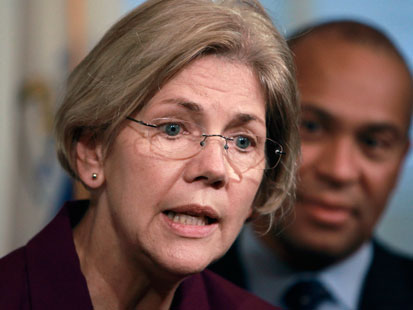
The senator-elect from Massachusetts defeated incumbent Senator Scott Brown in a hard-fought 2012 election. She will be the first woman senator from her state, and she also raised more campaign money than any other Senate candidate in 2012.
A bankruptcy law expert, she has served as an assistant to Obama and a special advisor to the Secretary of the Treasury for the Consumer Finance Protection Bureau, where she wasn't afraid to publicly state her disagreement with Treasury Secretary Timothy Geithner. She also spoke directly before former President Bill Clinton at the Democratic National Convention, where she blamed Wall Street for much of the nation's economic woes.
In late 2011, a video of Warren talking about the state of the country went viral.
"You moved your goods to market on the roads the rest of us paid for; you hired workers the rest of us paid to educate; you were safe in your factory because of police forces and fire forces that the rest of us paid for," she said. "You didn't have to worry that marauding bands would come and seize everything at your factory, and hire someone to protect against this, because of the work the rest of us did. Now look, you built a factory and it turned into something terrific, or a great idea. God bless – keep a big hunk of it. But part of the underlying social contract is, you take a hunk of that and pay forward for the next kid who comes along."
Obama made similar remarks in a 2012 speech where he uttered the now infamous line, "You didn't build that."
Look for Warren to play a key role in economic and budget discussions in Congress next year.
5. Marco Rubio
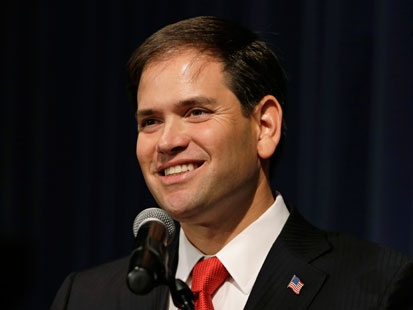
The junior senator from Florida has been serving in the Senate since 2011. The Cuban-American Miami native was a top contender for the vice presidential nomination in 2012, a position that ultimately went to Paul Ryan. Rubio has been a vocal Republican voice on immigration reform and one of only a handful of Hispanic Republican senators. He is the only Hispanic Republican senator currently serving, although he will be joined by Ted Cruz in January. Should he choose to run for president in 2016, he may provide the link to Hispanics that his party is desperately seeking following their poor showing with Latinos in the 2012 presidential election.
Rubio has been a vocal advocate for immigration reform. He spent the early part of 2012 trying to develop a bill that would have given legal residency to young immigrants brought to the country illegally by their parents. He later sidelined such efforts after Obama's deferred action announcement. Unlike the DREAM Act that many Democrats support, Rubio opposes a special pathway to citizenship, such as amnesty.
He said in early December that he thinks Congress should pass a series of bills that help foreign entrepreneurs, technology workers, agricultural workers and children brought to the country illegally. He has also said issues such as employment verification of legal status and border security need to be addressed.
Rubio also hasn't been shy about criticizing anti-immigration rhetoric within his own party either.
"Unfortunately I think the Republican Party for many years allowed itself to be positioned as the anti-illegal immigration party," he has said. "What we really need to be is the pro-legal immigration party."
6. DREAMers
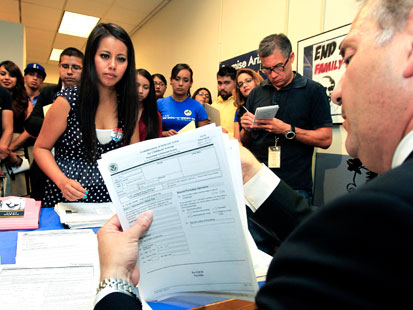
Young undocumented immigrants – people who can't cast ballots – had an undeniable political impact this year. They successfully pushed the Obama administration into enacting deportation relief through deferred action, and have held widely covered rallies around the country in locations as diverse as Los Angeles and Kansas City. TIME even nominated undocumented immigrants to be their "Person of the Year."
And following an abysmal showing among Latino and other minority voters, the Republican Party has begun speaking about the need for immigration reform, with some conservative pundits even arguing for a path to citizenship for undocumented people, an idea that has previously been decried as amnesty by the party.
Youth-led movements such as United We DREAM have gained traction, with politicians on both sides of the aisle taking notice. Look for DREAMers to continue to be a vocal voice in the immigration debate this coming year.
7. Paul Ryan
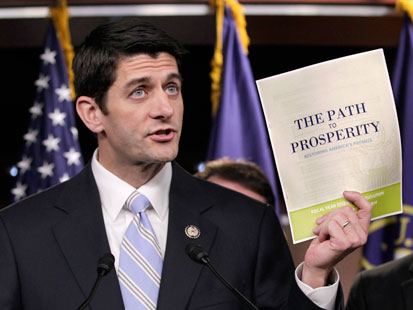
Wisconsin Representative Paul Ryan was relatively unknown before clinching the Republican vice presidential nomination that catapulted him to national recognition.
The self-proclaimed "numbers guy" hit the campaign trail with a vengeance after Mitt Romney named him as a running mate, slamming Obama for failing to fix the economy.
He serves as current chair of the House Budget Committee, a position he will continue to hold in the next Congress.
Ryan has advocated for education reform, such as tightening the eligibility for Pell Grants, and a voucher system for Medicare. He opposed Obama's healthcare overhaul, although he voted in favor of the auto bailout.
He has also made it clear he opposes the DREAM Act and says it treats a symptom, not the root of the immigration problem.
"We must first secure the border and stem the flow of illegal immigration, and then work to increase legal immigration through an enforceable guest worker program and by developing a more secure employee verification system. I believe it would be a serious mistake to pursue piecemeal reforms like the DREAM Act without first putting in place these fundamental components of immigration reform," reads a statement on his House webpage.
8. Grover Norquist
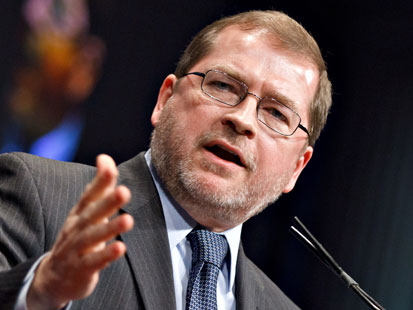
His wasn't a name heard much in the beginning of the year, but Grover Norquist has become a much-referenced figure as the "fiscal cliff" looms. The president of the Americans for Tax Reform is a vocal critic of increasing taxes for even the wealthiest Americans, something Democrats and President Obama advocate.
His "Taxpayer Protection Pledge," which opposed increasing taxes and the elimination of deductions and credits without a matching reduced tax rate, was signed by nearly all Republican members of Congress.
The fiscal cliff and the need for compromise across party lines has led some Republicans to criticize Norquist's cut-and-dry demands. Former Republican Senator Alan Simpson (R-Wyoming) of the Bowles-Simpson Commission has been particularly critical of Norquist's rigidity.
Norquist has advocated reducing the size of government as well, quipping, "I'm not in favor of abolishing the government. I just want to shrink it to the size where we can drown it in the bathtub."
"I hope he slips in there with it," quipped the 81-year-old Simpson.
While he's undeniably a divisive figure, Norquist has incredible influence among Republicans (Exhibit A: his Taxpayer Protection Pledge), especially when it comes to the fiscal cliff issues dominating the end-of-the-year political landscape.
9. Eva Longoria

This actress is more than just a pretty face in Hollywood. Longoria has thrown her weight behind President Obama, serving as co-chair of his re-election campaign and speaking at the Democratic National Convention in Charlotte, North Carolina.
Longoria served as one of the most prominent Latino "bundlers" for Obama, contributing the maximum amount of nearly $36,000 to his campaign and the Democratic National Committee, and then collecting hundreds of thousands of dollars in donations from others.
She also served as a vocal liaison between the campaign and the Latino community. According to a recent Washington Post article, Longoria spearheaded an effort called the Futuro Fund, which contributed at least $30 million toward the president's re-election.
Longoria was recently named a co-chair of Obama's inauguration committee.